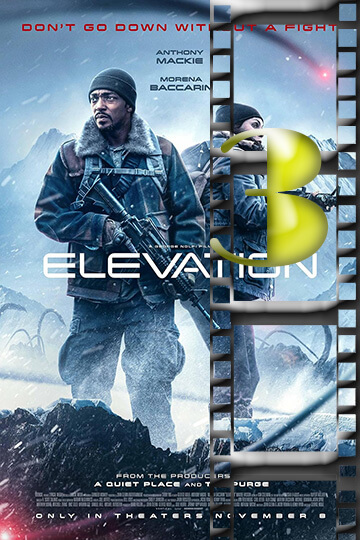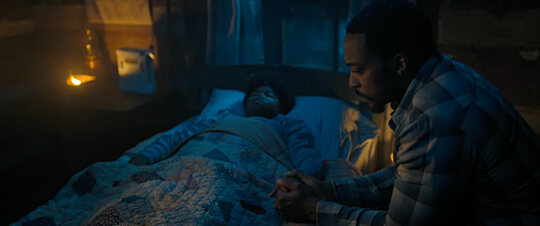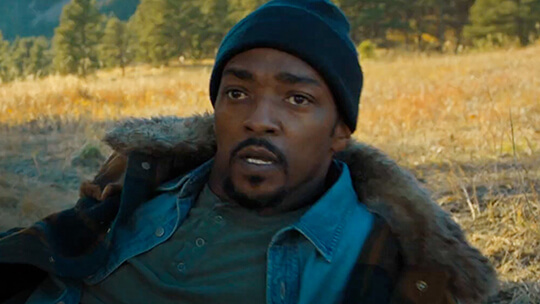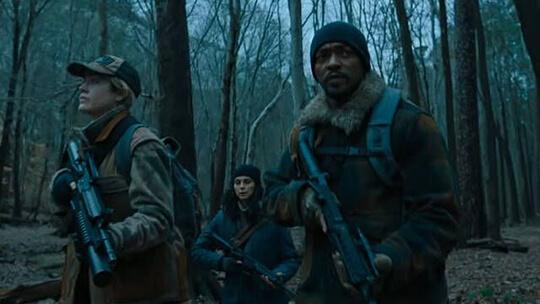





What’s It About
A single father and two women venture from the safety of their homes to face monstrous creatures to save the life of a young boy.



MOVIESinMO REVIEW
Ever since A Quiet Place’s success, Hollywood continues its pursuit of high-concept survival horror, with George Nolfi’s Elevation joining the ranks of imitators. While Netflix’s The Silence brazenly borrowed Krasinski’s formula and Arcadian explored light-sensitive monsters, Elevation introduces creatures that force humanity to retreat to higher ground. Set in Colorado’s Rocky Mountains, the story unfolds three years after mysterious beings dubbed “reapers” emerged from beneath the earth, decimating 95% of humanity. These predators, confined to lower elevations, have pushed survivors above an 8,000-foot threshold known as “the line.” Among these displaced refugees is Will (Anthony Mackie), who struggles to care for his ailing son Hunter (Danny Boyd Jr.) in their mountaintop sanctuary. When Hunter’s vital medical equipment begins failing, Will faces an impossible choice: risk descent below the safety line or watch his son’s condition deteriorate. He reluctantly partners with Nina (Morena Baccarin), a former Caltech physicist studying the reapers, and Katie (Maddie Hasson), his deceased wife’s closest friend. Their mission to raid a Boulder hospital is complicated by unresolved tensions—Nina’s previous attempts to combat the reapers resulted in the death of Will’s wife and several others. The monsters are a credible menace, tracking humans by detecting carbon dioxide and possessing robust protection. Still, they’re boring to look at, like generic dinosaurs, and they make the usual monster noises. The film’s CGI shortcomings become particularly evident in poorly lit sequences, while action scenes suffer from amateurish special effects, especially noticeable in gunfire exchanges and a particularly unconvincing Nolfi’s direction, paired with Shelly Johnson’s cinematography, relies heavily on drone shots that, while capturing the majestic mountain landscape, create an oddly detached viewing experience. Even intimate moments feel distant as if observed by hovering cameras rather than experienced alongside the characters. The screenplay falls into familiar post-apocalyptic tropes, populating its world with stock characters: the protective father, the loyal friend, the troubled scientist harboring guilt, the sick child, and the deceased spouse who drives the plot. While Baccarin manages to inject some life into her role through sardonic delivery and scientific exposition, Mackie’s usually engaging screen presence feels subdued, resulting in a surprisingly flat performance. Despite hints at deeper themes—wild horses roaming freely while humans are hunted suggests possible environmental commentary—Elevation never develops these ideas meaningfully. Instead, the film sticks to the survival horror template set out by its predecessors, neither delivering fresh perspectives nor memorable setpieces save for one tense confrontation at an abandoned ski resort. In the final accounting, Elevation is merely another entry in the increasingly clogged roster of post-A Quiet Place monster features, reaching for heights it never quite achieves. While it is ably crafted, with capable performances from its leads, the reluctance to take it beyond the beaten path grounds it squarely in the middle ground between innovation and imitation.
OUT RATING – A COPYCAT 3
MEDIA
- Genre – Science Fiction
- Street date
- Digital – November 26, 2024
- Blu-Ray/DVD – January 21, 2025
- Video – 1080p
- Screen size – 1.85:1
- Sound – English: DTS-HD MA 5.1, 2.0 Dolby
- Subtitles – English SDH
Extras
- none

